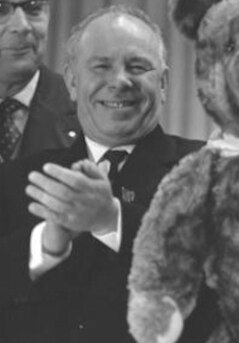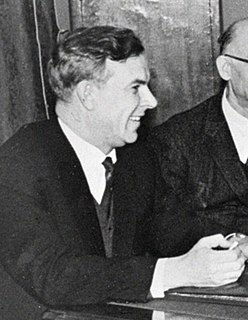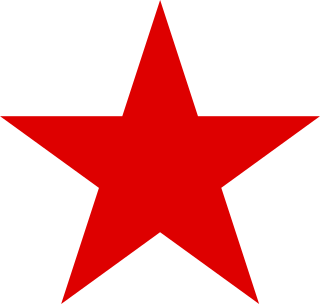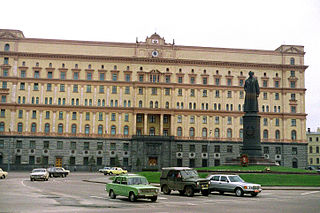
Leonid Ilyich Brezhnev was a Soviet politician. The fifth leader of the Soviet Union, he was General Secretary of the Central Committee of the governing Communist Party of the Soviet Union (CPSU) from 1964 until his death in 1982. Ideologically, he was a Marxist-Leninist. He presided over the Soviet's greatest involvement in world affairs, including détente with the West. But he also increasingly confronted the Sino-Soviet split, which divided and weakened communist parties across the world. In domestic affairs, he presided over a steady decline in the economy, marked by corruption, inefficiency, and rapidly widening weakness in technological advances, especially computers. Nevertheless he was a force for political stability inside the Kremlin, maintaining his power despite his rapidly declining health after 1975.

Andrei Pavlovich Kirilenko was a Soviet statesman from the start to the end of the Cold War. In 1906, Kirilenko was born at Alexeyevka in Belgorod Oblast to a Ukrainian working-class family. He graduated in the 1920s from a local vocational school, and again in the mid-to-late 1930s from the Rybinsk Aviation Technology Institute. He became a member of the All-Union Communist Party (bolsheviks) in 1930. As many like him, Kirilenko climbed up the Soviet hierarchy through the "industrial ladder"; by the 1960s, he was Vice-Chairman of the Bureau of the Central Committee of the Russian Soviet Federative Socialist Republic (RSFSR). After Nikita Khrushchev's forced resignation, Kirilenko became Leonid Brezhnev's "chief lieutenant" within the Central Committee.

Mikhail Andreyevich Suslov was a Soviet statesman during the Cold War. He served as Second Secretary of the Communist Party of the Soviet Union from 1965, and as unofficial Chief Ideologue of the Party until his death in 1982. Suslov was responsible for party democracy and the power separation within the Communist Party. His hardline attitude toward change made him one of the foremost orthodox communist Soviet leaders.

Nikolai Viktorovich Podgorny was a Soviet Ukrainian statesman during the Cold War. He served as First Secretary of the Central Committee of the Communist Party of Ukraine from 1957 to 1963 and as Chairman of the Presidium of the Supreme Soviet from 1965 to 1977. He was replaced as Chairman of the Presidium of the Supreme Soviet in 1977 by General Secretary Leonid Brezhnev. That same year he lost his seat in the Political Bureau (Politburo) and was forced to resign from active politics.
The Anti-Party Group was a group within the leadership of the Communist Party of the Soviet Union that unsuccessfully attempted to depose Nikita Khrushchev as First Secretary of the Party in June 1957. The group, given that epithet by Khrushchev, was led by former Premiers Georgy Malenkov and Vyacheslav Molotov. The group rejected both Khrushchev's liberalization of Soviet society and his denunciation of Joseph Stalin.

Alexander Nikolayevich Shelepin was a Soviet politician and security and intelligence officer. A long-time member of the Central Committee of the Communist Party of the Soviet Union, he served as First Deputy Prime Minister, as a full member of the Politburo and as the Chairman of the KGB from December 1958 to November 1961. He continued to maintain decisive influence in the KGB until 1967; his successor as KGB Chairman, Vladimir Semichastny, was his client and protégé.

Vladimir Yefimovich Semichastny was a Soviet politician, who served as Chairman of the KGB from November 1961 to May 1967. A protégé of Alexander Shelepin, he rose through the ranks of the Communist Youth League (Komsomol).

The 26th Congress of the Communist Party of the Soviet Union opened on February 23, 1981, with a five-hour address by the General Secretary of the party and the chairman of the Presidium of the Supreme Soviet (president) Leonid Brezhnev. This was the last Congress of Brezhnev, who died in 1982. Soviet television viewers saw only the beginning and end of the ailing leader's delivery; excerpts from the rest of the speech were read from the studio by an announcer. Brezhnev proposed another round of arms control talks. At a time when an aging Soviet leadership faced a decline in economic growth, severe food problems at home, grave uncertainties about its future relationship with the United States, and unsettling events in Poland, the congress ended its week of speeches by unanimously confirming the existing leadership. The congress elected the 26th Central Committee.
The full understanding of the history of the late Soviet Union and of its successor, the Russian Federation, requires the assessment of the legacy of Leonid Brezhnev, the third General Secretary of the Central Committee of the Communist Party of the Soviet Union (CPSU) and twice Chairman of the Presidium of the Supreme Soviet. Leonid Brezhnev was the leader of the CPSU from 1964 until his death in 1982, whose eighteen-year reign was recognised as the time of social and economic stagnation in the late Soviet Union.

The history of the Soviet Union from 1964 to 1982, referred to as the Brezhnev Era, covers the period of Leonid Brezhnev's rule of the Union of Soviet Socialist Republics (USSR). This period began with high economic growth and soaring prosperity, but gradually significant problems in social, political, and economic areas accumulated, so that the period is often described as the Era of Stagnation.

In Russia, communism began after Tsar Nicholas II lost his power during the February Revolution. The Provisional Government was established under Prince Lvov, however, the Bolsheviks refused to accept the government and revolted in October 1917, taking control of Russia. Vladimir Lenin, their leader, rose to power and governed between 1917 and 1924. The Bolsheviks formed the Russian Soviet Federative Socialist Republic, marking the beginning of the Russian Civil War between the revolutionary Reds and the counter-revolutionary Whites. In 1922 the Communist Reds were victorious and formed the Soviet Union. Lenin died in 1924, starting a power struggle which ended with Joseph Stalin seizing power. He was the leader of the Communist Party until 1953. He encouraged political paranoia and conducted the Great Purge to remove opponents of his dominance. Stalin died in 1953, and the Soviet Union went through "De-Stalinisation" under the new leader Nikita Khrushchev, though his attempts to improve the lives of ordinary citizens were often ineffective. Khrushchev ruled through the years of the Cold War. Leonid Brezhnev was appointed leader in 1964. Brezhnev governed the era without economic reforms, which led to a national economic decline by the mid-1970s.Yuri Andropov gained power in 1982 and tried to improve the economy by increasing management effectiveness but without making changes to the principles of a socialist economy. Andropov later died in 1984, fifteen months after gaining power.

The "History of Soviet Russia and the Soviet Union" reflects a period of change for both Russia and the world. Though the terms "Soviet Russia" and "Soviet Union" often are synonymous in everyday speech, when referring to the foundations of the Soviet Union, "Soviet Russia" properly refers to the few years between the October Revolution of 1917 and the creation of the Soviet Union in 1922.

Collective leadership or Collectivity of leadership, was considered an ideal form of governance in the Union of Soviet Socialist Republics (USSR) and other socialist states espousing communism. Its main task was to distribute powers and functions among the Politburo, the Central Committee, and the Council of Ministers to hinder any attempts to create a one-man dominance over the Soviet political system by a Soviet leader, such as that seen under Joseph Stalin's rule. On the national level, the heart of the collective leadership was officially the Central Committee of the Communist Party. Collective leadership is characterised by limiting the powers of the General Secretary and the Chairman of the Council of Ministers as related to other offices by enhancing the powers of collective bodies, such as the Politburo.

Vladimir Viktorovich Bogomolov was a Soviet security officer and a bodyguard of Leonid Brezhnev.

Vladimir Timofeyevich Medvedev is a retired Soviet KGB general and bodyguard who was responsible for personal security of Soviet leaders including Leonid Brezhnev and Mikhail Gorbachev.
The Nineteenth Congress of the Communist Party of the Soviet Union was held from 5 to 14 October 1952. It was the first party congress after World War II and the last under Joseph Stalin's leadership. It was attended by many dignitaries from foreign Communist parties, including Liu Shaoqi from China. At this Congress, Stalin gave the last public speech of his life. The 19th Central Committee was elected at the congress.
The following lists events that happened during 1962 in the Union of Soviet Socialist Republics.



















